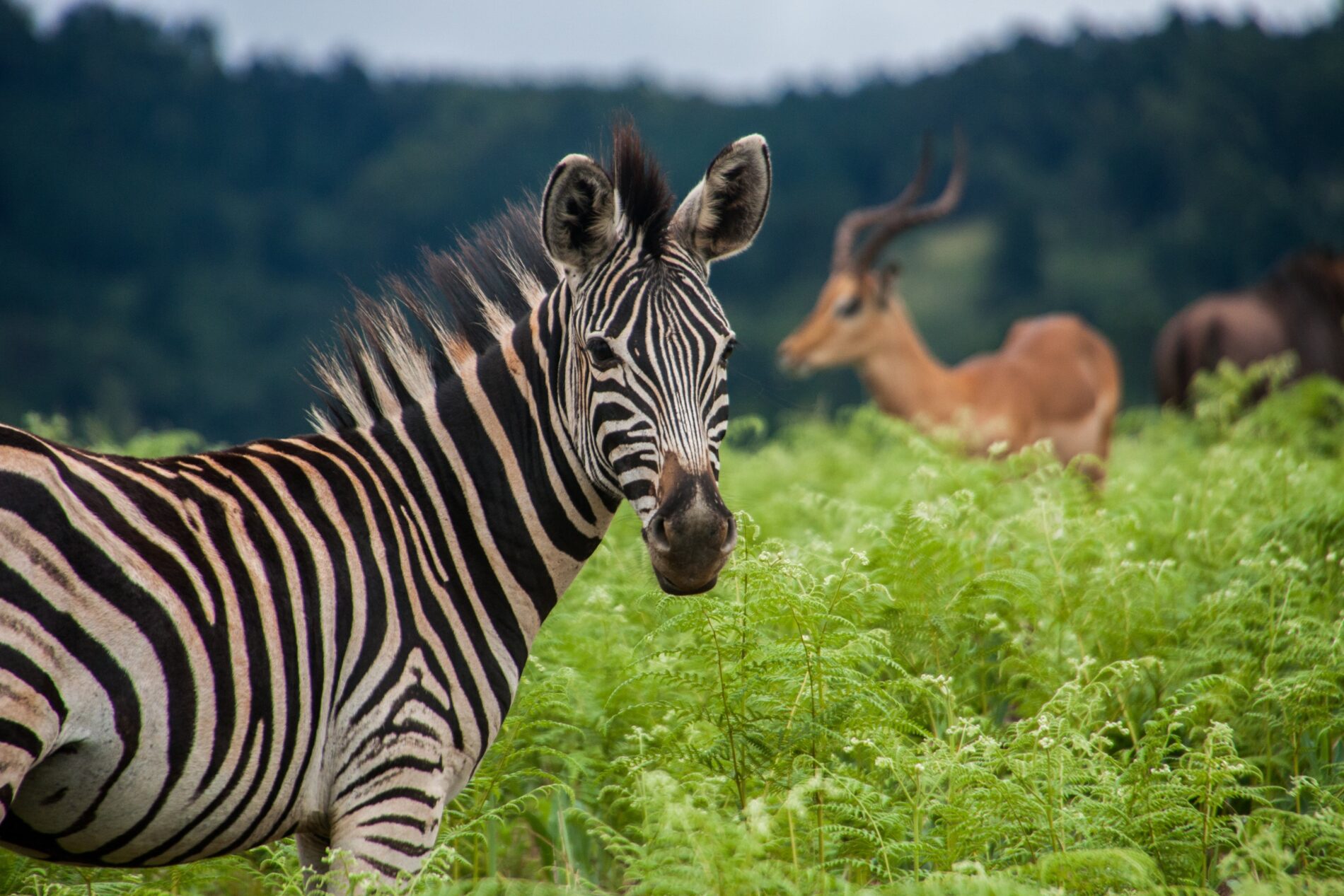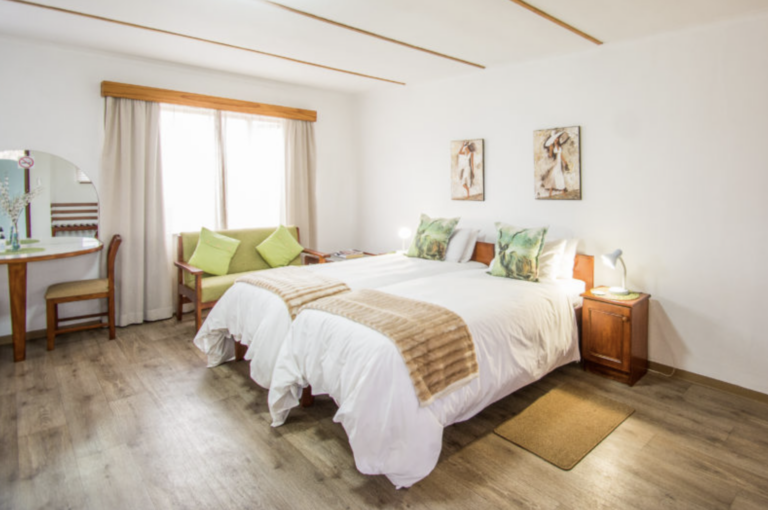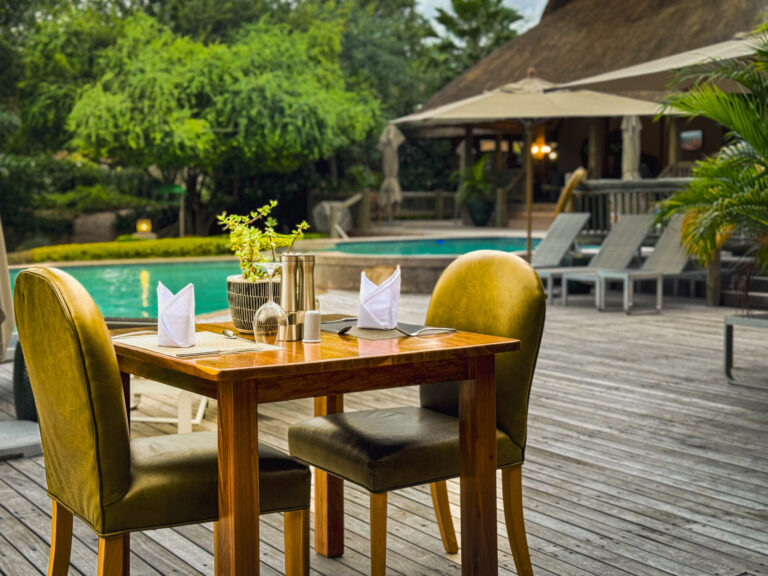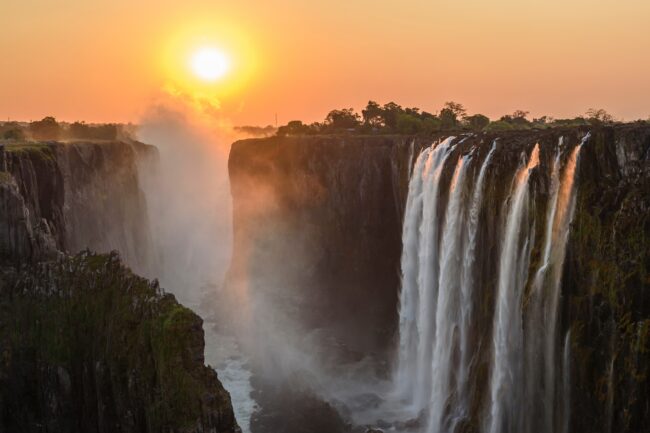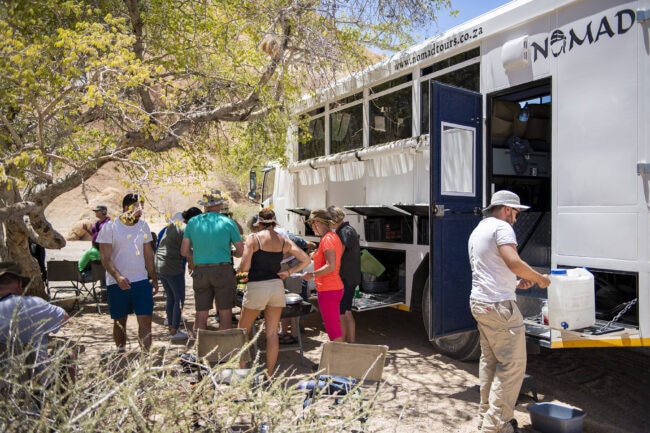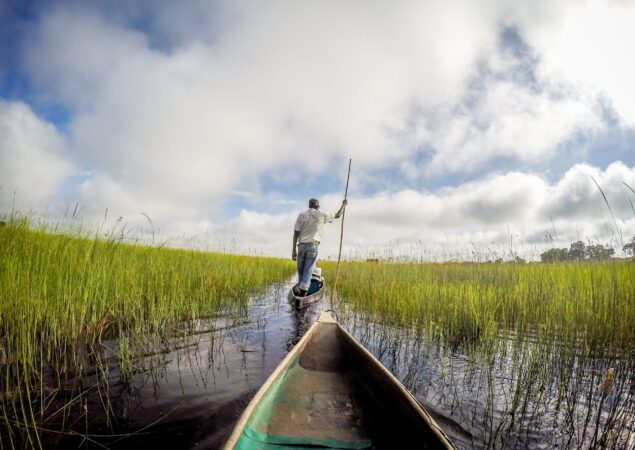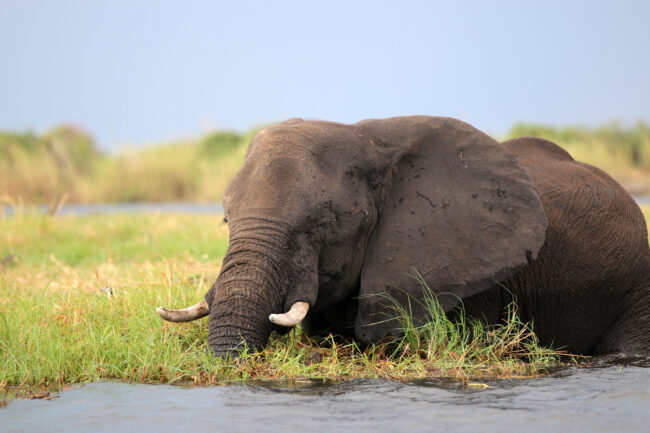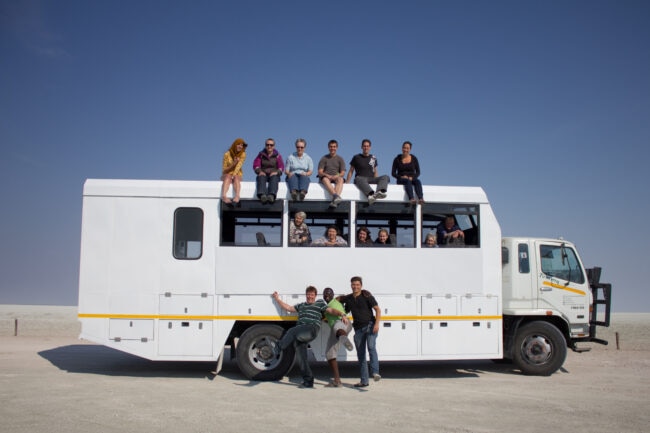What to Expect
- Flexibility is Key: Your itinerary should be used as a guide because, well, this is Africa! Expect changes due to the vast distances and evolving circumstances. Rest assured, every adjustment is made with the group’s best interests in mind.
- Accommodation Considerations: While we make every effort to stick to the accommodations listed, please note that they serve as guidelines, and adjustments may occur. We recommend obtaining the latest version of the itinerary at least one week before departure to stay informed of any changes.
- Embrace Diversity: Get to know your fellow travellers! With a mix of ages, nationalities, and cultures, everyone has a unique story. Take this chance to connect and learn from one another.
- Pack Smart: Space inside the vehicle is limited, so leave the hard suitcases behind. Choose a soft duffel bag or backpack. Refer to “Luggage Requirements” for more details.
- On the Road: Please be mindful that road conditions can vary significantly. While some routes may offer smooth travel, factors like weather, road quality, and traffic congestion can influence our travel time. Be prepared for long hours on the road and consider bringing along games or books to keep each other entertained. In Africa, some roads may be uneven, leading to occasional bumpy rides during the journey.
- Each Region is Unique: Southern Africa and East Africa offer distinct experiences—never compare the two! They each have their own charm and allure.
- Tour Style: Our tours cater to adventure enthusiasts seeking authentic experiences. This is not your typical European coach tour.
- Participation and Interaction: While our guides handle most tasks, our tours aren’t your typical beach holiday – they’re adventures! Your help with tasks like washing up, food prep, and setting up camp makes a real difference, giving our guides more time to make your tour amazing. Remember, it’s all about teamwork and camaraderie.
- Combination Tours: Your tour might be part of a longer journey or a combination of tours. Don’t hesitate to ask us if you’re unsure about your itinerary—we’re here to help!
- All-Weather Adventure: Our tours operate year-round, so be prepared for any weather conditions, from scorching heat to chilly nights. Pack accordingly!
- Disconnect to Reconnect: Embrace the remote locations we visit. Switch off from the outside world and immerse yourself in the natural beauty surrounding you, far from the hustle and bustle of cities.
Pre & Post Tour Accommodation
Detour Africa is here to arrange a seamless experience, including pre and post-tour accommodation, as well as convenient airport transfers. Please ask your consultant for assistance.
Passport & Visa Requirements
PASSPORT
Ensure your passport has sufficient pages for all required visas, with a minimum of 2 clear pages for each country you’ll be visiting. Note that South Africa requires 2 clear pages upon entry, especially crucial if you plan to fly home from South Africa after touring multiple African countries.
Additionally, ensure that your passport is valid for at least six months after your departure date from Africa. It’s wise to keep a copy at home or with friends. Consider taking a photo of your passport and its contents, and emailing it to yourself for added security.
Using more than one passport (to avoid visa payments) is not advisable. For example, when entering Namibia, the immigration official must see the exit stamp for South Africa in the same passport for entry clearance.
VISA REQUIREMENTS
It is your responsibility to secure any necessary visas for your upcoming trip. Visa requirements differ based on your nationality and destination so please contact the various embassies or visa service agencies to check visa requirements. We also advise that you recheck visa requirements at least four weeks before departing for your tour as regulations can change.
Detour Africa will not be held responsible for clients being denied entry should they not be in possession of the relevant visas.
Ensure a smooth journey by having a valid onward or return flight or proof of alternative transportation to depart from the country where your tour ends. Alternatively, show proof of sufficient funds, such as a credit card, enabling you to purchase an air ticket for your departure.
Here is a useful link to check your visa requirements. Travel Visa Checker
These are subject to updates and may vary based on your nationality so please double check this info directly with the embassies for each country.
Important Notice: New Visa Requirements for Namibia (Effective April 1, 2025)
From April 1, 2025, Namibia will require visas for travelers from over 31 countries that do not offer visa-free entry to Namibian citizens. This includes nationals from the United States, United Kingdom, Germany, Austria, Belgium, Italy, the Netherlands, and Switzerland.
Visas will be issued on arrival, with fees set at N$1,600 (approximately €80) for travelers from non-African Union (AU) countries and N$1,200 for AU member states.
Disclaimer: This information is for general guidance only. Visa regulations are subject to change, and we recommend confirming details directly with the Namibian embassy or consulate in your country.
Medical & Health Requirements
VACCINATIONS
To ensure a healthy and worry-free adventure, we recommend considering the following vaccinations for your journey through Africa: Hepatitis A (Havrax), Cholera, Yellow Fever, Tetanus Booster Shot, and Rabies.
It is crucial to note that this is only a general recommendation. For the most accurate and up-to-date vaccination requirements, we strongly advise consulting with your doctor or a travel clinic. They can provide personalized guidance based on your health history, ensuring you receive the most relevant and current information to stay protected during your travels. Your well-being is our priority, and we want you to embark on your African adventure fully prepared and in good health.
YELLOW FEVER
Many countries require you to have a valid international yellow fever vaccination certificate to enter. This is required if listed as a yellow fever risk area or if you travel from an area with a yellow fever risk such as Kenya and Uganda. Presentation of this certificate might be necessary upon arrival at airports or border crossings, and some countries may deny entry without it. Additionally, it is customary for your home country to request proof of yellow fever vaccination upon your return. Making sure you’ve got this documentation is crucial for a seamless travel and re-entry experience.
Here is a useful link showing areas with moderate to high risk: Yellow Fever Affected Areas
Yellow fever is transmitted by a specific species of mosquito prevalent in the “yellow fever belt,” spanning regions of both Africa and South America. The virus can be easily prevented through a simple and highly effective vaccination, which is routinely available at travel clinics. Getting vaccinated against yellow fever is a proactive measure to protect against this mosquito-borne disease.
Ensure you receive the yellow fever vaccination at least 10 days before entering a yellow fever zone. The vaccine requires this period to provide effective protection, and getting it earlier helps avoid potential flu-like symptoms. After vaccination, you’ll receive an International Certificate of Vaccination or Prophylaxis (ICVP) from the travel clinic, serving as proof of your inoculation.
COVID-19
Detour Africa and our suppliers have implemented stringent COVID-19 protocols to prioritize your health and safety. While we diligently adhere to guidelines, it’s essential for clients to actively comply with each visited country’s requirements. Clients bear responsibility for their documentation, and we will not be liable if you are denied access to a country due to non-compliance.
In the unfortunate event of a client contracting COVID-19 during the tour, it’s important to note that all associated expenses, including testing, medical costs, hospitalization, and quarantine accommodation, will be the client’s responsibility. Additionally, no refunds will be issued for unused tour nights and services in such cases.
To maintain a secure and enjoyable experience for all, any guest not adhering to the established protocols may face expulsion from the tour. We emphasize the importance of securing adequate travel and medical insurance before arrival, ensuring comprehensive coverage for your peace of mind throughout your journey.
MALARIA
Malaria, a prevalent concern in certain regions, requires a proactive approach to safeguard your well-being. By using mosquito repellent and adhering to your prescribed malaria tablets, you can significantly mitigate the risks associated with this disease.
Mosquitoes, the carriers of malaria, thrive in areas with high concentrations of people and water. Minimize exposure by adopting protective measures such as:
- Wearing long-sleeved shirts, socks, closed shoes, and long pants during the evening hours when mosquitoes are most active
- Keep mosquito nets closed to create an additional barrier against potential mosquito bites.
- Consult with your healthcare provider to determine the most suitable antimalarial tablet options for your journey.
- An imperative line of defense against mosquito-borne illnesses is the application of an effective insect repellent, preferably in stick or lotion form. Prioritize products containing the active ingredient DEET, as it is renowned for its efficacy in repelling mosquitoes.
It is crucial to comprehend that malaria prophylactics do not serve as preventive measures but act as treatment modalities in the event of contraction. Moreover, these medications contribute to minimizing the severity of the illness. Contrary to misconceptions, malaria is curable with prompt medical intervention.
Here is a useful link to check malaria-affected areas: Malaria Affected Areas
Insurance
Medical insurance is a mandatory requirement. Your guide will request your policy number before the tour begins so please keep your insurance details handy when starting your tour. Ensure that your travel and medical insurance covers both cancellation and emergency evacuation in case of serious illness or injury, especially considering our tours often venture far from well-equipped hospital facilities. It’s important to note that credit card insurance might not offer sufficient coverage, so we strongly recommend obtaining a separate travel insurance policy for comprehensive protection.
Many of our customers opt for World Nomads Travel Insurance and highly recommend their services. While we’re not directly affiliated with World Nomads, we do encourage you to explore their offerings to secure a reliable insurance solution for your journey.
IMPORTANT NOTICE FOR TRAVELERS VISITING ZANZIBAR
Starting October 1, 2024, all international visitors entering Zanzibar through airports or seaports must have valid Inbound Travel Insurance. This insurance, available only through the Zanzibar Insurance Corporation, provides coverage for emergencies during your stay (up to 92 days). A QR code will be provided to confirm your insurance, and travelers without this may be denied entry.
For more details, visit https://visitzanzibar.go.tz, email inbound@zic.co.tz, or call 0800008005.
Luggage Requirements
Please note that the weight limit for luggage is a strict maximum of 23kg (including a small day pack and your main backpack).
Should you find yourself needing a larger baggage allowance, please ask your consultant if it’s possible and we’ll do our best to accommodate your needs. Please note that larger/excess baggage arrangements are not always guaranteed.
It’s crucial to keep in mind that luggage should exclude any Samsonite-style or solid-framed suitcases. The overland truck is crafted for your comfort and has been designed to hold backpacks or soft-framed bags. The solid frame of wheelie/trolley bags may pose challenges, as they don’t fit into the dedicated lockers at the back of the truck which is where you will store your luggage.
The locker sizes are approximately ±35cm sq, 80cm deep.
Please keep this in mind when choosing your bag. We also recommend using a padlock to keep your belongings secure.
Please also review your tour itinerary, as a smaller day pack will generally be needed for shorter excursions that take place during your trip.
What to Pack
Please be advised that Africa experiences varying weather patterns, and conditions on your tour may differ. It’s important to check and monitor the specific weather for your destination, as temperature shifts can be significant.
Early morning and late evening game drives may be chilly during certain times of the year. Most excursions take place in open 4×4 safari vehicles for extended periods, potentially the entire day. Considering this, it’s recommended to have clothing that provides protection against wind chill and keeps you warm.
Opt for clothing that is easy to wash and dry, and preferably doesn’t require ironing. Avoid synthetics, which can be uncomfortable in hot weather.
Here are some suggested items to pack for all weather conditions:
- Shorts or a skirt
- Waterproof Jacket
- Tracksuit or pullover for comfort
- Long pants or jeans
- Comfortable walking shoes, boots, or trainers
- Sandals
- 2 or 3 T-shirts
- 1 or 2 Long Sleeve Shirts
- Swimwear
- Underwear
- Socks
- Hat or Cap
- Raincoat for unexpected showers
- Kikoi or sarong for versatility
- Beanie and gloves for winter travels
Additional suggested items for your packing list:
- Sleeping Bag and Pillow (only applicable for camping guests)
- Towel
- Wet wipes
- Toiletries
- Torch with ample spare batteries
- Camera with extra batteries and memory cards
- Reusable water bottle
- Insect and mosquito repellent
- Suntan lotion, sunblock, and after-sun lotion
- Sunglasses
- If you wear glasses or contact lenses, it’s advisable to bring a spare pair.
- USD cash for tips and souvenirs
- Small basic First Aid kit including painkillers, band-aids, after-sun lotion, eye drops, and anti-diarrheal tablets.
Meals & Drinking Water
MEALS
Please refer to your tour itinerary for details on what meals are included on your tour. These are mainly served from the purpose-built overland truck.
For meals not included, you can purchase them from nearby supermarkets, take-away spots, and restaurants. Your guide can suggest the best local spots to purchase meals.
Meal Overview:
- Breakfast: Tea, coffee, bread, spreads, cereals, yogurts, and fruits. Occasionally, there’s time for a hot breakfast with scrambled eggs, porridge, bacon, or beans.
- Lunch: Quick and easy sandwiches and salads, such as rice salad, pasta salad, tuna salad, and green salad, served at a roadside picnic spot.
- Dinner: Guides focus on preparing substantial protein, vegetable, and carbohydrate dinners. Expect traditional campfire cuisine like braais (BBQ), potjie (stew), bobotie (mince), spaghetti, fish, and chicken dishes.
To ensure we cater to your specific needs, please inform us of any special dietary requirements at the time of booking. It’s important to note that we cannot accommodate requests made at the start of the tour, so giving us a heads-up during the booking phase is key.
Special Requirements:
- Vegetarian: Accepted on tour.
- Pescatarian & Vegan: Also accepted on tour, but treated similarly to vegetarians. Keep in mind that certain specialty foods might not be readily available en route.
- Celiac: Accepted on tour.
- Halaal & Kosher: Available on request before booking your tour.
- Lactose Intolerant: Accepted on tour. Products containing lactose will be excluded from meals, and clients can bring along their preferred lactose-free products.
While we strive to cater to dietary requirements during these tours, please consider the group setting and limited cooking facilities. Guides typically prepare meals on two gas burners, making it challenging to accommodate various dietary needs simultaneously.
For vegans, guides provide salads, vegetables, fruits, rice, beans, pasta, cereals, and bread. However, certain specialty items like quinoa, seeds, nuts, tofu, and soya milk might not be available, so it’s recommended to supplement these at your own expense.
Guides prioritize shopping at supermarkets for safety reasons. Purchasing from street vendors may pose health risks, and supporting local farmers through street vendors can inadvertently contribute to theft and the unsustainability of local farms.
DRINKING WATER
Your well-being is our priority, and we advise against consuming tap water, even within hotels. The mineral content may differ significantly from what you’re accustomed to at home. While locals are acclimated to these variations, visitors may experience discomfort or illness. Although typically not severe, the resulting upset stomach can disrupt a day or two of your holiday. To ensure a worry-free stay, many hotels and lodges offer safe drinking water, and bottled water is readily available as an alternative. Proper hydration is crucial, aiming for approximately two liters a day. As a precaution, consider bringing rehydration salts, motion sickness tablets, and diarrhea blockers from home. These essentials can be sourced from pharmacies and will contribute to a more secure and enjoyable travel experience.
Participation
As we work together to create an amazing journey, a bit of assistance from the group goes a long way. Your involvement not only ensures the guides have more time for you but also enriches the overall tour experience. This is an African adventure, not just a holiday in the sun.
All overland tours are designed with limited participation, and we appreciate your collaboration in the following areas:
- Washing Up Duties: Assist with cleaning up after meals – a small effort that makes a big difference.
- Food Preparation: Offer your help in the kitchen if time is tight – your contribution adds to the culinary experience.
- Truck Duties: Contribute to loading and unloading your chair, tent and mattress (if booked on camping option), etc.
- Keeping It Clean: Help maintain the cleanliness of the truck and cooler box – after all, it’s your home for the coming days and weeks.
- Tent Duties (if booked on camping option): Pitching and dismantling your tent – a bit challenging the first time, but it becomes a breeze with practice.
While we provide your camping equipment (if booked on camping option), and kitchen utensils, please treat them with care. Anything broken or lost on tour is not easily replaceable. While our guides take charge of the cooking, feel free to offer your culinary skills to the group. The more you engage, the richer the group experience becomes.
Transport
The purpose-built overland trucks on this tour are equipped with 24 seats, yet we limit tour groups to a maximum of 20 guests to guarantee ample space for everyone. We want everyone to feel included and build friendships along the way, so we encourage seat rotation throughout the journey. This means you’ll get to meet and chat with different people as you travel!
The trucks do not have air conditioning, but feature sliding windows that offer a refreshing breeze and excellent opportunities for wildlife photography.
Transportation is a vital aspect of our tours, which are primarily road trips characterized by long drives, rugged terrain, and the odd mechanical challenges. Embracing these experiences, including the occasional truck retrieval from mud, can add a unique experience to your journey.
Our trucks are well maintained and undergo regular servicing to ensure optimal performance. Despite our efforts, breakdowns are not uncommon, and resolving mechanical issues in Africa may require patience. Rest assured, our team prioritizes resolving any issues swiftly to minimize disruptions to your travel plans.
Translators
All the tours are conducted primarily in English by an English-speaking guide. For certain tour departures, we offer the convenience of a German or Italian translator to aid travelers who may not feel confident conversing in English. It’s important to note that these translators are typically foreign students and may not always be familiar with the details of the tour. They function as assistants rather than guides, facilitating communication between guides and guests.
Money & Currencies
Money can significantly impact your tour experience, so it’s essential to budget wisely. Africa isn’t known for being inexpensive, so prudent spending is key.
In Southern and East Africa, both local currencies and US Dollars are widely accepted. However, keep in mind that exchange rates for local currencies can fluctuate regularly. Before embarking on your tour, be sure to check the current exchange rate.
CASH
When carrying US Dollars, ensure they’ve been printed after 2008. It’s advisable to request a range of bill denominations from your bank, reserving smaller ones for tipping and larger ones for settling bills if needed. Safeguard your cash in a flat money belt worn close to your body, while keeping a small amount readily accessible for convenience.
CREDIT CARD
Credit Card facilities are available in major cities, though some establishments may impose surcharges. Visa and MasterCard are widely accepted, whereas Diners and American Express may have limited acceptance. Remember to inform your bank of your travel plans to avoid any card access issues while abroad.
ATM’s
With ATM’s becoming more prevalent in major towns, cities and airports, utilizing credit or debit cards provides a convenient and accessible means to access funds during your journey. Ensure your cards feature chip and pin technology for secure transactions.
DEPARTURE TAX
Some countries will charge a departure tax when leaving on international flights. Typically, these taxes must be paid in cash currency, with US Dollars often preferred. Departure tax amounts can range from US$10 to US$60, depending on the departure point. Be sure to account for these expenses when planning your travel budget.
TIPPING
Tipping is a customary practice in most African countries, particularly in restaurants where around 10-15% is considered standard for good service. Feel free to adjust this based on the level of service – more for exceptional experiences and, of course, no obligation if the service falls short.
When it comes to taxi drivers, tipping is discretionary and not always expected. If uncertain, your guides are excellent resources. They can advise you on local norms and suggest appropriate amounts in the local currency.
For our exceptional crew, tipping is a thoughtful way to acknowledge their hard work or those instances where they’ve gone above and beyond. To streamline the process, we recommend appointing one person in your group to collect contributions. Place the collected amount in an envelope and present it to your guide(s) at the end of the trip.
A suggested amount is 2-3 USD per person per day. Remember, tipping is a gesture of appreciation for outstanding service and is by no means obligatory. Your comfort and satisfaction are our top priorities throughout your journey.
Solo Travellers
Our travel style is perfect for solo adventurers who want shared experiences and safe exploration in Africa.
On this tour, solo travellers (or odd-number travellers) doing the camping option are paired with a same-gender guest (as indicated on their passports) and pay the camping – twin share price. For the campers who prefer their own space, we can arrange a single tent / room at an additional fee.
Solo travellers (or odd-number travellers) doing the accommodated option on this tour must book a single room and cannot share with other guests.
Travelling with Children
Certain African countries require travelers entering or leaving the country with a minor (under the age of 18) to present an unabridged birth certificate that includes details of both parents. In some cases, if a child is traveling with only one parent or without both parents, additional documentation such as a parental consent affidavit may be required. This affidavit typically needs to be notarized. Travel regulations, including those related to documentation for minors, can change. Governments periodically review and update their travel policies, so it’s crucial to check with the relevant embassies, consulates, or official government websites for the most current information.
Travel Responsibly with Green Seats
We recognize the impact that travel can have on the environment.
On this tour there is an option for you to contribute to environmental conservation efforts by selecting a ‘Green Seat’ during your booking process. By choosing the green seat, you’ll be making a valuable donation towards conservation initiatives. The Green Seat program helps fund important projects aimed at making Africa greener and more sustainable. Simply inform your consultant during the booking process if you’d like to participate.
Wi-Fi Access
The overland trucks aren’t equipped with Wi-Fi, however, there will be stops along the way that offer Wi-Fi, whether complimentary or paid. We unfortunately can’t guarantee its availability, signal strength, or reliability on our diverse routes.
We therefore recommend purchasing a local SIM card in the countries you’re traveling through. You can usually find them easily in major cities, and some vendors may even sell them at border posts. Be aware that reception might be limited in many of the remote areas we explore.
Add-on Activities
We understand that every traveler has unique preferences, budgets, and interests. Plus, weather conditions can play a role in the activities available. That’s why we’ve designed our itineraries to be flexible, allowing you to tailor your experience.
During your tour, you’ll have the opportunity to choose from a range of activities that are not included in the standard package. Your guide will provide insights and recommendations to help you decide which extra activities align with your interests.
It’s important to note that these activities are operated by trusted third-party operators, ensuring a seamless and enjoyable experience. So, whether you’re an adventure seeker or prefer a more relaxed pace, you have the freedom to enhance your journey with activities that resonate with you. Please ask your consultant for an up-to-date list of add-on activities available to you on your tour.
If your tour includes a gorilla / chimp encounter, please read the information below carefully.
IMPORTANT INFORMATION ABOUT GORILLA & CHIMPANZEE TREKKING PERMITS:
Gorilla Trekking Permit:
Gorilla Trekking is optional but must be pre booked. The cost of a gorilla trekking permit ranges from USD 865 to USD 950 per person. This permit must be purchased before your trip and is not included in the tour price. For the most up-to-date pricing, please contact us closer to your departure. Gorilla trekking permits are extremely limited, so flexibility in both your tour itinerary and the location of your visit is essential.
Chimpanzee Trekking Permit:
Chimp trekking is optional, however if you choose not to join, you’ll wait at the visitor centre for about 2–4 hours while others take part. Let us know in advance if you decide not to participate.
The cost of the Chimp trekking permit ranges from USD 140 to USD 240 per person.
Chimp trekking is limited to 12 guests per trek. If there are more than 12 guests on a tour, the group will be divided between a morning and afternoon trek. This means you may do the boat cruise first, followed by chimp trekking, or vice versa. We kindly ask for your flexibility with the schedule.

